

|
|
Konga
R2 - United Kingdom - Network Review written by and copyright: Paul Lewis (10th May 2013). |
|
The Film
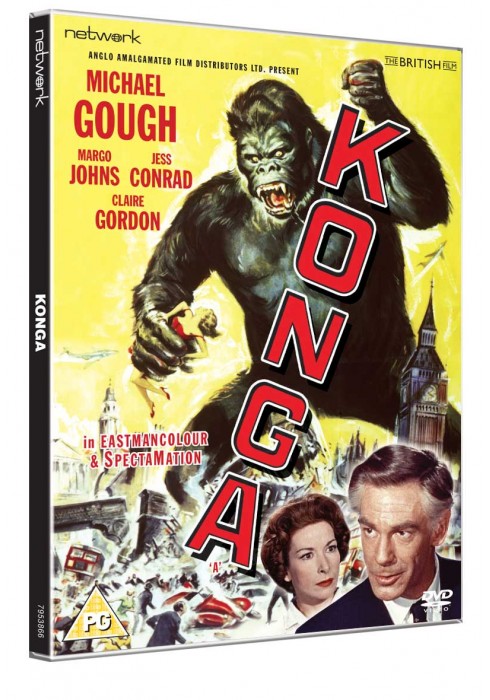 Konga (John Lemont, 1961) 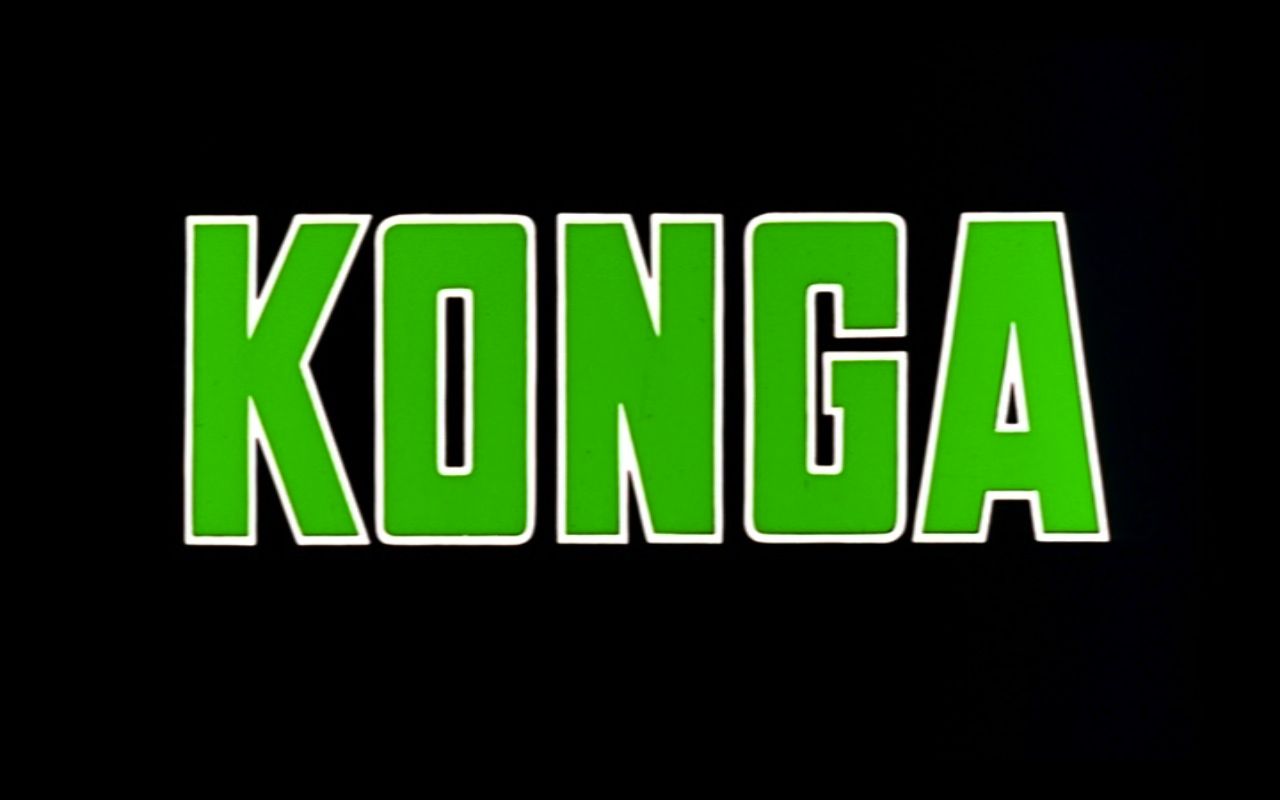 Herman Cohen has asserted that Konga (directed by John Lemont) came about because ‘Nat [Cohen] and Stuart Levy were so excited about the business that [Horrors of the] Black Museum did in England and Europe […], they said, “Herm, can you do another exploitation type of picture?” Well, I had always flipped over King Kong and Mighty Joe Young and all that, so I came up with Konga and Aben and I started writing the script’ (quoted in Weaver, 2003: 69). The effects on Konga took eighteen months to complete, and during this time AIP were ‘after me [Cohen] constantly’ because ‘[t]hey didn’t realize how much fucking work was involved, ‘cause they never used [such] special effects at that time’: AIP had produced effects-heavy films before (for example, Bert I Gordon’s monster films) but, as Cohen notes, ‘Konga was in color’ (ibid.). Herman Cohen has asserted that Konga (directed by John Lemont) came about because ‘Nat [Cohen] and Stuart Levy were so excited about the business that [Horrors of the] Black Museum did in England and Europe […], they said, “Herm, can you do another exploitation type of picture?” Well, I had always flipped over King Kong and Mighty Joe Young and all that, so I came up with Konga and Aben and I started writing the script’ (quoted in Weaver, 2003: 69). The effects on Konga took eighteen months to complete, and during this time AIP were ‘after me [Cohen] constantly’ because ‘[t]hey didn’t realize how much fucking work was involved, ‘cause they never used [such] special effects at that time’: AIP had produced effects-heavy films before (for example, Bert I Gordon’s monster films) but, as Cohen notes, ‘Konga was in color’ (ibid.).
The film opens with a plane flying over a forest. Its engine sputters, and on the soundtrack we can hear the jabber of monkeys. The plane crashes. Cut to a radio room. A newsreader announces that in Africa, ‘a small private plane bearing Doctor Charles Decker, famous English botanist, burst into flames and crashed into the jungle depths’. The accident took place a week previously. The doctor and the pilot haven’t been found. A fade to black is followed by a shot of a newspaper seller in London. A headline announces that Doctor Decker has returned after almost a year. At a press conference, Decker (Michael Gough) reveals that after the crash, he was rescued by a tribe of natives, and he has been accompanied on his journey home by a monkey, Konga. A journalist asks Decker why it took him a year ‘to get back to civilisation’. ‘You mean, of course, what you choose to call “civilisation”’, Decker responds. He started to think of the crash as ‘a lucky accident’ that allowed him to study some rare species of plants. On the subject of Konga, Decker tells the journalists, ‘Konga helped me find my way to the village. We’ve grown rather attached to each other’. 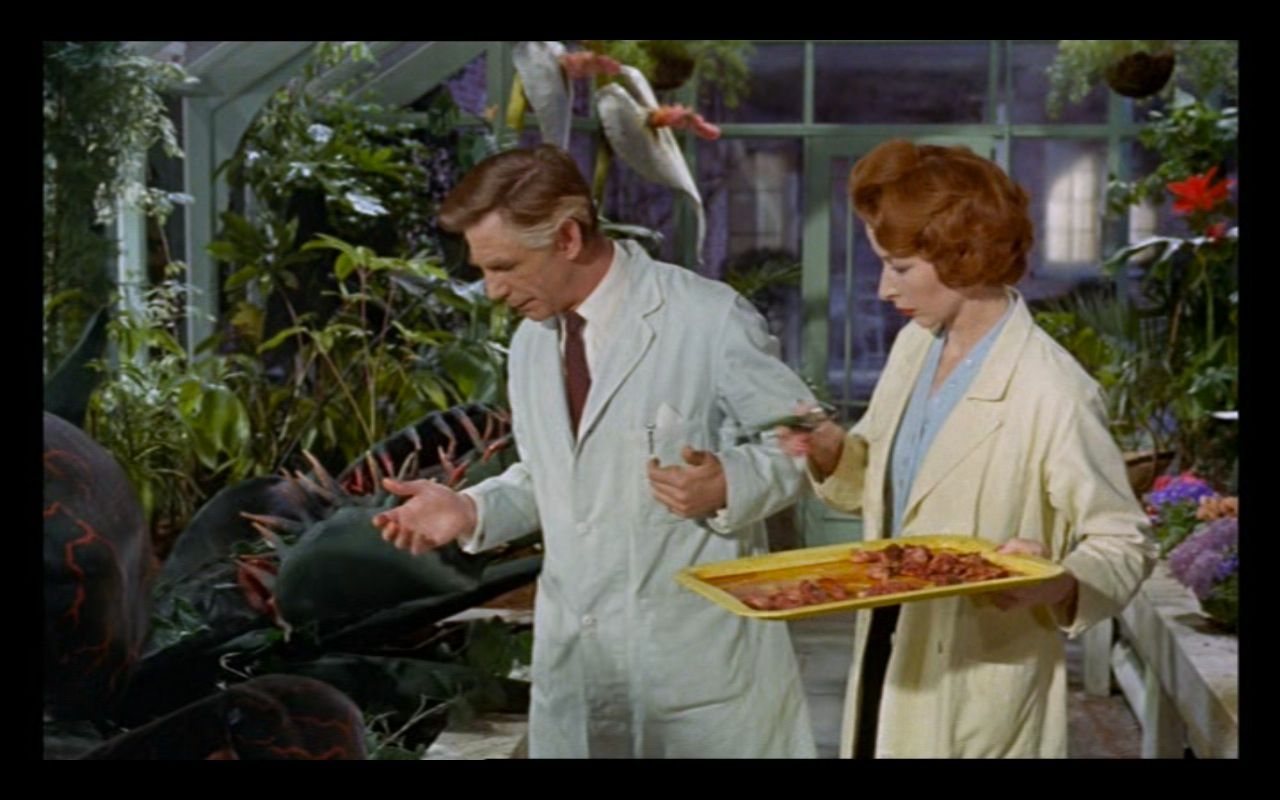 Konga is reunited with his assistant Margaret (Margo Johns). ‘You should realise that to call a woman “just a good friend” is almost an insult’, Margaret tells Decker. ‘You know there’s very little room for sentiment in the life of a scientist’, Decker informs her. Konga is reunited with his assistant Margaret (Margo Johns). ‘You should realise that to call a woman “just a good friend” is almost an insult’, Margaret tells Decker. ‘You know there’s very little room for sentiment in the life of a scientist’, Decker informs her.
Decker continues his research, which involves establishing ‘the link between vegetable and animal life’. He injects Konga with a serum derived from the venus flytrap. ‘That little chimp is the first in a long line of kings, kings of the Earth’, Decker tells Margaret: ‘That little chimp will become the first link in modern evolution between plant and animal life’. The serum makes Konga grow. Meanwhile, Decker returns to work, lecturing at a university, and becomes infatuated with a pretty blonde student, Sandra (Claire Gordon). He also comes into conflict with the university’s Dean, Foster (Austin Trevor), who tells him that the university ‘keeps getting repercussions of that interview you gave the other day’ in which Decker established ‘a closer evolutionary link between plant life and humans’. ‘In other words, you don’t object if I make an ass of myself, so long as I don’t besmear the sacred name of the college [….] But what if the shoe was on the other foot? [….] What if my findings would reflect great glory on the school?, Decker asks the Dean, before adding maniacally: ‘Ultimately, I shall be able to change the shape of human beings’. Foster becomes Konga’s first victim, after Decker hypnotises Konga into obeying Decker’s will. As the police close in, Decker becomes increasingly infatuated with Sandra, to the ire of both Margaret and Sandra’s boyfriend Bob (Jess Conrad). Eventually, Margaret hypnotises and ‘reprogrammes’ Konga, and Konga abducts Decker before rampaging through the city. 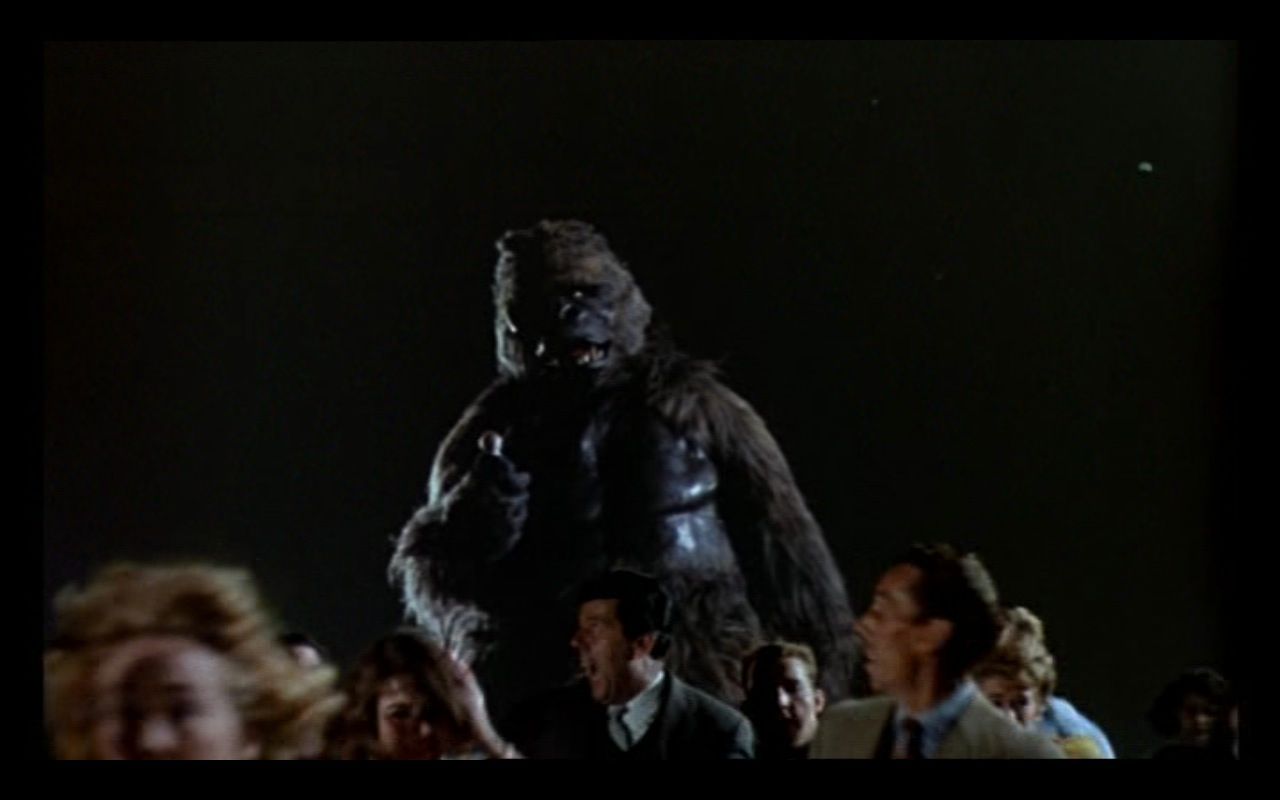 As the above synopsis might suggest, Konga closely follows its model, King Kong (Merian C Cooper & Ernest B Shoedsack, 1933): the climax of the film refers directly to the iconography of King Kong, with Konga climbing Big Ben, Decker in hand, in the same way as King Kong scaled the Empire State building carrying the object of his desire, Ann Darrow (Fay Wray). However, in Konga this sequence also draws on the climax of Mary Shelley’s Frankenstein (1818): like Victor Frankenstein, Decker sees his life threatened by the creature he, through his serum, has created. Decker is the very stereotype of a ‘bad scientist’. When, after Decker has forced Konga to kill Dean Foster, Margaret declares, ‘Charles, I never dreamed you would kill’, Decker informs her of just how little value he places in life: ‘You knew I had to sooner or later […] to prove that my work with Konga was a success. I had to know whether obedience to my will was one of the properties I could convey with my serum [….] Regrettable, but in science a human being is only a subject’. As the above synopsis might suggest, Konga closely follows its model, King Kong (Merian C Cooper & Ernest B Shoedsack, 1933): the climax of the film refers directly to the iconography of King Kong, with Konga climbing Big Ben, Decker in hand, in the same way as King Kong scaled the Empire State building carrying the object of his desire, Ann Darrow (Fay Wray). However, in Konga this sequence also draws on the climax of Mary Shelley’s Frankenstein (1818): like Victor Frankenstein, Decker sees his life threatened by the creature he, through his serum, has created. Decker is the very stereotype of a ‘bad scientist’. When, after Decker has forced Konga to kill Dean Foster, Margaret declares, ‘Charles, I never dreamed you would kill’, Decker informs her of just how little value he places in life: ‘You knew I had to sooner or later […] to prove that my work with Konga was a success. I had to know whether obedience to my will was one of the properties I could convey with my serum [….] Regrettable, but in science a human being is only a subject’.
Decker’s increasing obsession with Sandra also marks him as deviant. ‘I can’t get over how you’ve grown’, he tells her on their first meeting in the film, before offering her the opportunity to take part in ‘extra curricular experiments’. Later, on a field trip, Sandra sits up front in the vehicle with Decker, who is driving. He tells her, ‘I don’t always think of you as a student’ and suggests ‘perhaps we can carve out a little time […] for ourselves’. However, Bob reminds Sandra – and, in case they have forgotten, the audience – that ‘His [Decker’s] authority as a teacher should end in the classroom’. Of course, Bob becomes the next target of Decker’s, and therefore Konga’s, wrath. (When Margaret reacts to news of Bob’s murder, Decker tells her coldly, ‘If there’s one thing I can’t abide, it’s hysterics, especially in the morning’.) 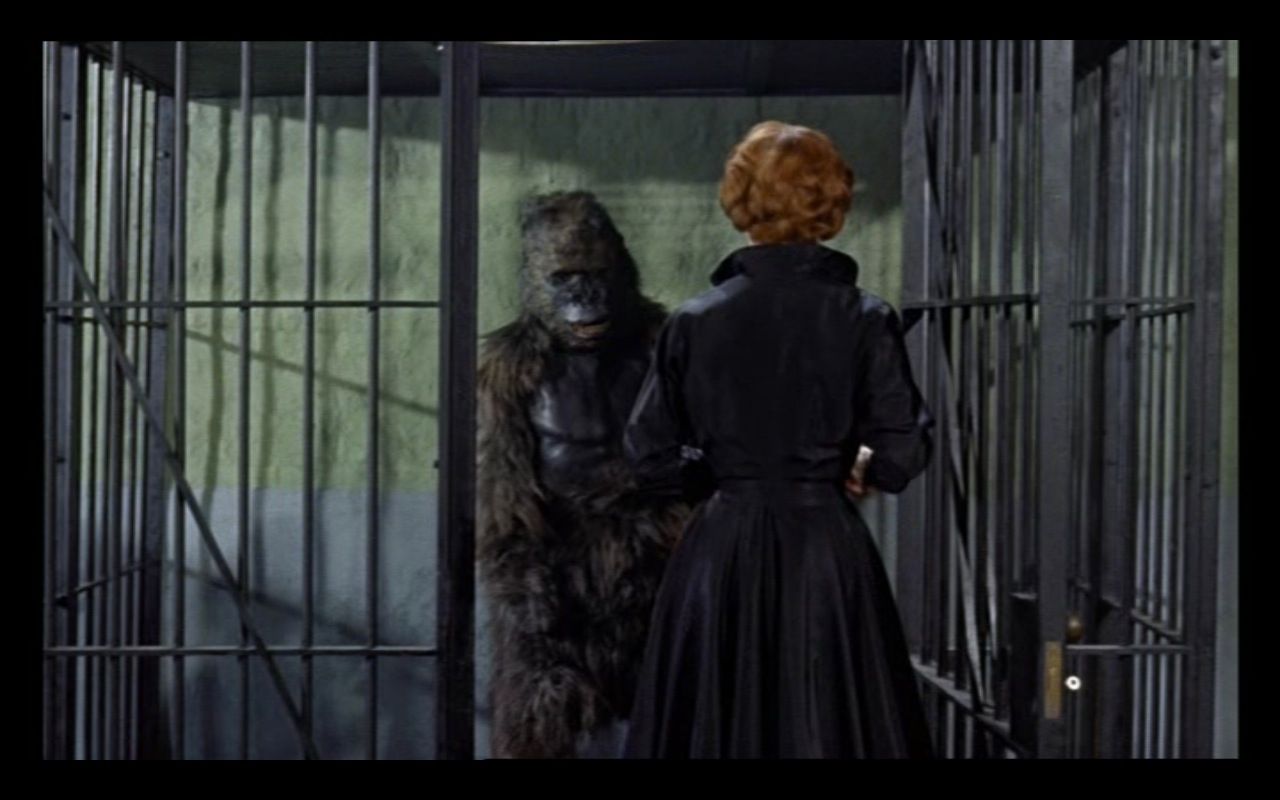 In Better Living Through Bad Movies (2006), Scott Clevenger jokes that ‘[a]lthough the message is subtle (typical British understatement), this is the cinema’s most eloquent evocation of that old aphorism, “People who mutate chimps shouldn’t molest co-eds in glass houses.” Something like that’ (166). Like King Kong, Konga could be said to represent sexual jealousy and desire: Decker uses Konga to eliminate Bob, who represents a barrier to his sexual ‘conquest’ of Decker’s student Sandra, and when Margaret – who is clearly in love with Decker – becomes aware of Decker’s lust for Sandra (and the murder of Bob), she reprogrammes the ape to take revenge against Decker. The climax of the film sees Michael Gough’s prissy Decker taking the role of Fay Wray’s Ann Darrow in King Kong: it’s a moment that, through its reversal of gender roles, seems almost intentionally camp, and a fitting end to a film whose delights lie in its moments of outrageous excess. In Better Living Through Bad Movies (2006), Scott Clevenger jokes that ‘[a]lthough the message is subtle (typical British understatement), this is the cinema’s most eloquent evocation of that old aphorism, “People who mutate chimps shouldn’t molest co-eds in glass houses.” Something like that’ (166). Like King Kong, Konga could be said to represent sexual jealousy and desire: Decker uses Konga to eliminate Bob, who represents a barrier to his sexual ‘conquest’ of Decker’s student Sandra, and when Margaret – who is clearly in love with Decker – becomes aware of Decker’s lust for Sandra (and the murder of Bob), she reprogrammes the ape to take revenge against Decker. The climax of the film sees Michael Gough’s prissy Decker taking the role of Fay Wray’s Ann Darrow in King Kong: it’s a moment that, through its reversal of gender roles, seems almost intentionally camp, and a fitting end to a film whose delights lie in its moments of outrageous excess.
Reflecting on this climax, Cohen has claimed that when time came to shoot the sequence in which Konga rampages near the Embankment in London, he was told that it would be almost impossible to get permission from the Metropolitan Police. Cohen was surprised to find that ‘you can’t bribe an English bobby; unlike in New York, Chicago, Detroit or L.A., it won’t work’ (Cohen, quoted in Weaver, op cit.: 71). Cohen arranged a meeting with the ‘inspector in charge of the precinct in Croyden, which is the jurisdiction of the Embankment area’ and the inspector told Cohen that he wished he ‘could afford a color television set’ (ibid.). Cohen bought a colour television set and had it sent to the inspector’s home, and ‘suddenly I had permission to shoot on the streets in London! The thing that I didn’t mention to him was that, at the finale, all hell was going to break loose—that we were going to shoot sub-machine guns, bazookas, etc., etc. I purposely didn’t tell him this’ (ibid.). The film runs for 86:25 mins (PAL).
Video
The film is presented in its original aspect ratio of 1.66:1, with anamorphic enhancement. It’s a handsome presentation. The rich colour palette is represented nicely, and there’s as much depth and detail to shadows as the DVD format will allow. 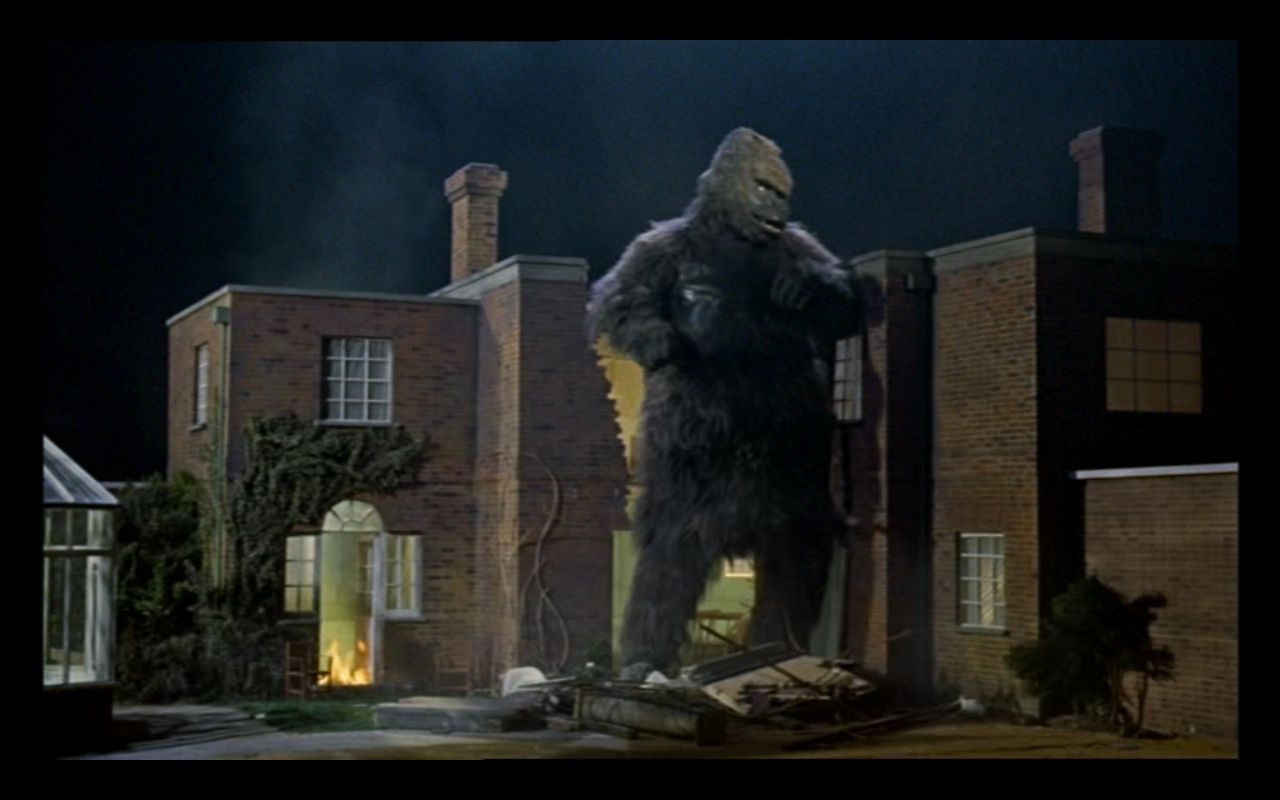 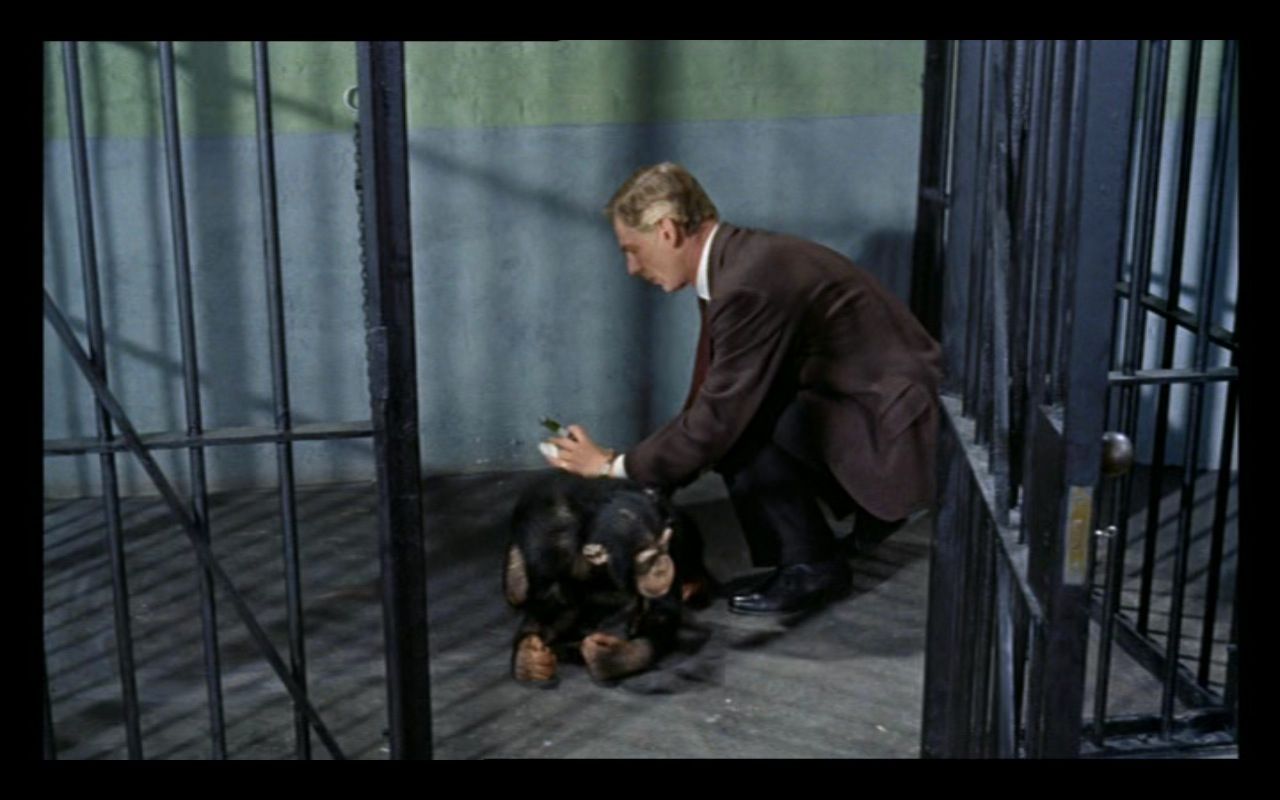
Audio
Audio is presented via a two-channel mono track. This is clear and without issues. Sadly, there are no subtitles.
Extras
The disc begins with a surprise introduction by Jess Conrad (unskippable). The DVD also includes the film’s trailer (2:13) and a stills gallery (3:22) containing posters, lobby cards, the UK VHS cover, pressbook and on-set stills.
Overall
It would be very hard to argue, by any objective standards, that Konga is a ‘good’ film. However, it is a highly entertaining film. The picture has some wonderfully eccentric dialogue, much of it delivered with glee by Gough (‘We know each other much better than the world suspects’, Decker tells Konga) and by some of the secondary characters (Stanley Morgan’s Inspector Lawson informs another character that Dean Foster was killed by a creature with ‘an arm strong enough to literally tear his head off’). In a typical moment of hucksterism, Cohen once noted that although ‘Konga only cost about five hundred thousand dollars, in color, […] the effects were so good that people thought the picture cost millions’ (Cohen, quoted in Weaver, op cit.: 69). When Konga takes hold of Decker and rampages through the streets of London, you’ll certainly doubt Cohen’s claim. (You might be a monkey’s uncle.) Nevertheless, there’s much camp fun to be had here, including the way in which, at the film’s climax, Decker is given the Fay Wray role from Konga’s direct model, King Kong. The presentation of Konga on this disc is good, easily surpassing the barebones and non-anamorphic disc from MGM in the US. References: Clevenger, Scott, 2006: Better Living Through Bad Movies. Bloomington, Indiana: iUniverse Weaver, Tom, 2003: Double Feature Creature Attack: A Monster Merger of Two More Volumes of Classic Interviews. London: McFarland This review has been kindly sponsored by: 
|
|||||

|